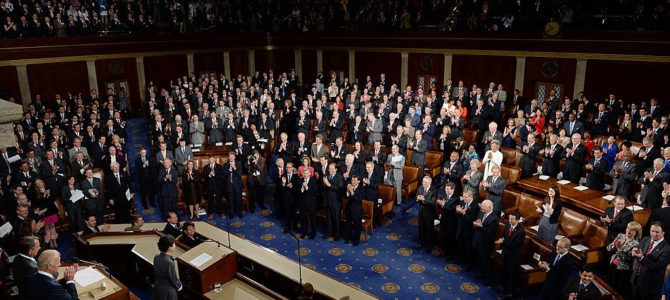
In the ninth lecture of Hillsdale College’s free online Constitution 101 course (which you can take along with me here) professor Kevin Portteus explains how the New Deal corrupted the separation of powers that the U.S. Constitution established.
The New Deal led to the rise of the administrative state, to which Congress frequently delegates its regulatory power. Its programs were so vast, they required a massive team of people to carry out. Instead of being divided up into three entities — legislative, judicial, and executive, as prescribed by the Constitution — the government is now functionally divided into the political and administrative states.
How Progressive Government Takes Power From Citizens
In modern America, politicians promise outcomes — clean air, better schools, workplace safety, etc. — and leave it up to those in the administrative state to devise a system to deliver. This outcome-based progressive understanding of the rule of law is fundamentally opposed to how colonists and early Americans understood it. Today, when the legislature governs, it merely proposes priorities then delegates the details of implementing them to bureaucrats. Federal agencies are left to create rules and develop guidelines on their own and can punish the American people for breaking these rules even though those people did not have through elected representatives a say in creating those rules.
Under this re-imagined structure, decisions are no longer made by the people. They are made by special interests: the bureaucrats regulating the issue, interest groups, and corporations. The massive bureaucratic state makes it so the people no longer decide how something is regulated, and groups that have traditionally sided with the common man, like labor unions, favor this because many of them are on the inside and get a seat at the decision table. As a result, regulations are made not for the benefit of the American people, but to benefit the corporations who depend upon certain regulations and contracts from the government.
How The New Deal Changed All Three Branches Of Government
The federal judicial system also reflects this shift. Interested parties can now sue on behalf of the American people. An environmental group can claim to be suing on behalf of the people, when perhaps the changes they are pushing for might not benefit those they claim to represent. In addition, courts do not consider or weigh outcomes of regulations or programs devised by administration officials, because these bureaucrats are considered the experts in a given field and it is assumed that they know what they’re doing. To interfere is to undermine their expertise.
President Franklin Delano Roosevelt — who, under the guise of equality, expanded the role of government to an unprecedented degree — normalized the imperial presidency. After FDR, presidents are now expected to campaign on a set of policies they intend to implement once in office. And the success of a president’s tenure in the Oval Office is measured, in large part, by how much of this legislative agenda he can ram through Congress.
Both chambers of Congress have ramped up the number of staffers they employ and increased their number of committees to expedite law-passing. And gridlock in Congress, which the Founding Fathers hoped would restrain government growth, is often circumvented when legislators hand off swaths of power to bureaucrats.
How The New Deal Conditioned Americans To Think Government Is The Answer
The New Deal paved the way for President Lyndon B. Johnson’s Great Society and the war on poverty that ensued. Throughout this expansion of government, which was supposed to help impoverished Americans, the poor got poorer and bureaucracy got bigger. Today, there are 45 million Americans living below the federal poverty line, despite the fact that every year, an increasing amount of taxpayer dollars is spent ostensibly to relieve their suffering.
In a speech in favor of presidential candidate Barry Goldwater, actor Ronald Reagan critiqued this increased spending on welfare and pointed out that bureaucrats eat a big chunk of the taxpayer funds between collection and distribution.
We have so many people who can’t see a fat man standing beside a thin one without coming to the conclusion that the fat man got that way by taking advantage of the thin one. So they are going to solve all the problems of human misery through government and government planning. Well, now, if government planning and welfare had the answer and they’ve had almost 30 years of it, shouldn’t we expect government to almost read the score to us once in a while? Shouldn’t they be telling us about the decline each year in the number of people needing help? The reduction in the need for public housing?
But the reverse is true. Each year the need grows greater, the program grows greater. We were told four years ago that 17 million people went to bed hungry each night. Well, that was probably true. They were all on a diet. But now we are told that 9.3 million families in this country are poverty-stricken on the basis of earning less than $3,000 a year. Welfare spending is 10 times greater than in the dark depths of the Depression. We are spending $45 billion on welfare. Now do a little arithmetic, and you will find that if we divided the $45 billion up equally among those 9 million poor families, we would be able to give each family $4,600 a year, and this added to their present income should eliminate poverty! Direct aid to the poor, however, is running only about $600 per family. It would seem that someplace there must be some overhead.
Reagan points out that expanding the role of government won’t solve all the problems. Instead it will reduce the voice of American citizens and put governing power into the hands of unelected bureaucrats, big businesses, and special interest groups. Circumventing the checks and balances put in place by the Constitution leads to less freedom, and more government.









